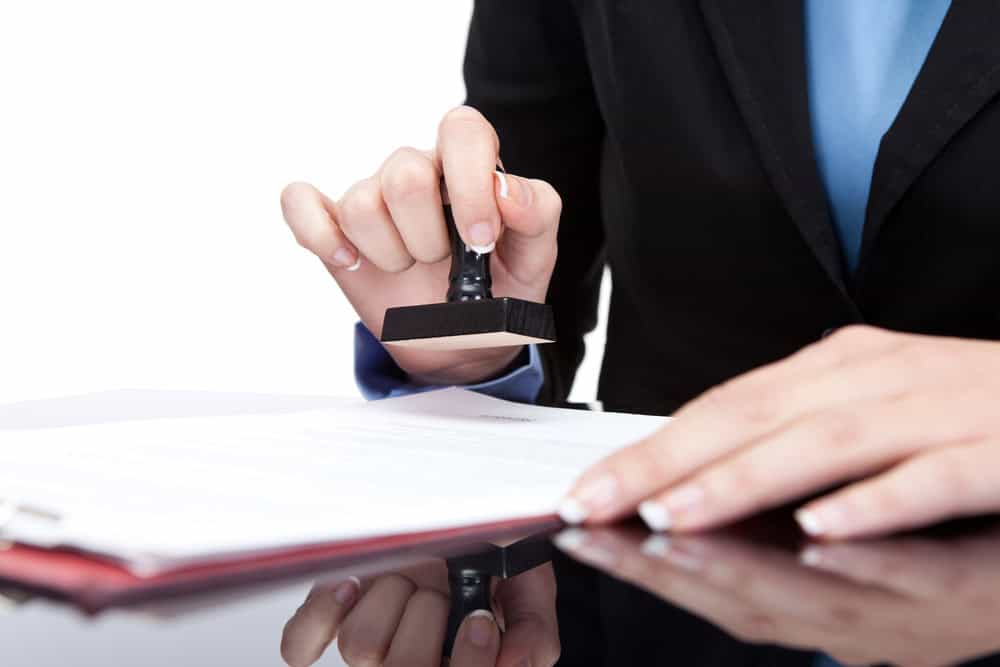The time has finally come: you have found the condominium of your dreams. You have already made contact with the seller, you have agreed on a purchase price and now you want to complete the purchase of the property. We break down for you how the notary appointment works and how you can best prepare for this important step in the process of buying a property. What documents need to be submitted and what costs are incurred by the seller and buyer of a condominium? We address all these questions in this article.
What tasks does a notary have when buying a condominium?
The notary is responsible for the notarization of the purchase contract. This means that the buyer and seller of a property must attend an appointment at the notary’s office, where the purchase contract is signed by both parties in the presence of the notary. In Germany, there is no way around this, as a purchase contract only becomes legally binding once it has been notarized by a notary.
The notary has already checked in advance whether all requirements are met in order to proceed with the purchase process. Among other things, this includes ensuring that the land register is free of land charges for the property. Accordingly, the notary is responsible for monitoring the legal process of selling a home. Once the purchase contract has been signed, the next steps must be taken. These include, for example, the entry of the new land charge in the land register and the change of ownership in the land register.
The exact procedure for the sale of a property is set out in the notarial contract. It is the notary’s job to ensure that this procedure is followed.

What criteria should be used to select the notary?
The amount of a notary’s fee is prescribed by law. The notary’s fees are therefore not the criterion that you can use as a guide when choosing a suitable notary. Other factors therefore come to the fore. For example, you should feel that you are in good hands with the notary. Trust is very important, after all, buying a property involves a high financial outlay. You should also consider the following aspects when looking for the right notary:
The notary should be located near you or close to the property. You will have to deal with the notary several times during the house purchase process. It would be very inconvenient if you had to travel a long way for each appointment. A good reputation usually precedes a notary. Look for recommendations from other people or search the Internet for references and testimonials from other clients of a notary who is on your shortlist. A notary’s comprehensible language is also very important. The purchase contract for a property is subject to numerous clauses. Your notary should be able to explain everything to you clearly, even if it is your first real estate purchase. In addition, it is of course a basic requirement for a good notary to have the necessary further training and to be very familiar with the legal basis.
Who commissions the notary?
From a legal perspective, both the buyer and the seller are authorized to appoint a notary. In most cases, however, it is the seller who makes the choice. The seller’s estate agency may know a good notary who can be entrusted with handling the sale of the property. If you want to buy a property, you need not fear any disadvantage from the choice of seller. The notary is legally obliged to remain neutral. He is in breach of his official duty if he does not maintain this neutrality. If you still have the feeling that the notary is not responding to your questions adequately and is not informing you fully, simply suggest a new notary to the seller of the property. The costs are the same, as they are regulated by law. Under normal circumstances, these are borne by the buyer of a property.
What documents are required for the notary appointment?
A large number of documents are required at the notary appointment. Both the buyer and the seller want to complete the purchase process as quickly as possible. For this reason, it is helpful if as many documents as possible are available at the appointment. The majority of the documents must be applied for at the land registry. In addition, there are other documents that are also required.
What documents does the seller need to bring to the notary appointment?
Documents for loans if land charges still exist
- Other documents attesting that the property is debt-free
- Rights of residence / use
- Remediation notes
- Current land register extracts
- For condominiums: Statement of charges, house rules, overview of reserves, declaration of division, partition plan,
- Minutes of owners’ meetings
- Original purchase contracts
- Proof of monument protection
- Rental agreements or leases
- Current property tax assessment
- Energy certificate
- List of equipment or furnishings, if this is taken over by the buyer
What documents does the buyer need to bring to the notary appointment?
- A photo ID on which you are clearly recognizable (passport, identity card)
- Tax identification number (not the tax number)
- Documents of the financing or loan
- Land charge form of the financing bank

Preparing to buy a condominium: What should be clarified before the notary appointment?
Under normal circumstances, the notary appointment is only arranged once the seller and buyer have agreed on the purchase process for a property. This is why certain things need to be clarified, because the appointment with the notary, at which the purchase contract is signed by both parties, marks the start of the final phase of the sales process.
Before the notary appointment, the buyer and seller discuss the purchase price of the property and the payment arrangements. In most cases, the seller wants to be paid the full amount of the sale price, which is why the buyer takes out a loan from a bank. The handling of liabilities that exist at the time of the sale must also be discussed. For example, there may be a heritable building right. Side agreements include, for example, whether the buyer will take over certain built-in furniture. The property is inspected by the buyer and seller together. The condition of the property is recorded. It is not normally possible to report material defects at a later date. The handover of the property is also planned by the buyer and the seller.
All information relating to the purchase process must be passed on to the notary. In this way, the notary can prepare the notary appointment in the best possible way and draw up the purchase contract.
How exactly does the notary appointment work when buying a condominium?
The procedure for the notary appointment is largely regulated. Of course, deviations may occur depending on the wishes and requirements of the buyer or seller.
The appointment with the notary begins with the notary greeting both parties personally and inviting them into the meeting room. There are two reading copies of the purchase agreement on the table. This is the current version in which the agreements of the contracting parties have been recorded. The notary asks for the buyer’s and seller’s identity documents to verify their identity. The notary then examines the buyer’s financing documents and the seller’s documents showing possible creditors.
It may well be that the seller or buyer has questions about the purchase contract. For example, the buyer may still want to renegotiate the purchase price, or material damage may have been noticed during the inspection of the property that has not yet been included in the purchase agreement. The notary tries to attend the meeting as a neutral mediator. He may not take sides for either the seller or the buyer during the negotiations. Once an agreement has been reached and the changes have been included in the purchase agreement, the notarization can begin.
The contract is read out in full by the notary. This step in the process is unavoidable and must be carried out for both short purchase contracts and complicated contracts. It is not uncommon for questions to arise about the contract after it has been read out by an impartial third party. If further changes are required, the notary will initially make these by hand in the margin of the document. He must ensure that the notes are easy to read. After the appointment, the buyer and seller receive the corrected version of the purchase contract. The notary must keep the original version including the marginal notes. If a dispute arises years later, this original version of the purchase contract can be referred to.
Once the reading has been completed and both parties have agreed to the purchase contract, it must be signed by the buyer and seller in front of the notary. This makes the contract legally binding and the next steps in the process can be initiated.
You should definitely pay attention to this when reading the purchase contract - the most important points for home buyers as a checklist
Under normal circumstances, you will have been able to read through the purchase contract before the appointment with the notary. You should raise any questions and comments before the contract is read out, but at the latest before it is signed. There are a few points in the purchase agreement that you should pay particular attention to during the reading:
- Exact amount for building, land and accessories
- Garage or road plots
- Special agreements
- Detailed description of the property
- Agreement on liability for material defects
- Date of transfer of the property
- Possible acceptances
- Service charge key date settlement
- Power of attorney issues relating to financing
- Road and development contribution costs
- Maintenance reserves according to WEG for condominiums in apartment buildings
- Separate disclosure of the transferred inventory
- Date of payment of the purchase price when the seller has eliminated all risks

How expensive is the notary appointment and who bears the costs?
Notary fees are set by law and are between 1.5 and 2 percent of the purchase price. It is not possible to obtain a price reduction, which is why discount negotiations are completely superfluous. The costs for the notary are borne by the buyer of a property and are one of the fixed additional costs when buying a property or plot of land. The notary’s costs are made up of the amendment fees for the land register entry and the notary fees.
If the notary appointment has to be canceled but the notary has already drawn up and completed the purchase contract, he will charge for this service. In principle, the invoice is issued to the person who commissioned the notary to draw up the draft purchase agreement, which is usually the buyer of a property.
Approximately how long does the appointment with the notary take?
The model for the course of the notary appointment is prescribed. There may be some deviations, as possible delays are usually caused by the seller’s or buyer’s requests for changes. In principle, you can plan a time frame of between 45 minutes and 60 minutes for the notary appointment.
Do I have to appear in person at the notary appointment?
The signing of a purchase contract and the associated acquisition of a property is a big deal. The seller and buyer therefore try to be present when the contract is read and signed. However, this is not always possible, which is why representation becomes necessary. There are two solutions to this problem:
Subsequent authorization for representation without power of attorney
It is possible to send a representative to sign the purchase contract who does not actually have any power of representation. This could be a friend, an adult child, a life partner or even a neighbor. This person signs the contract in front of the notary, which means that the purchase contract is deemed to have been accepted but is not yet legally binding. The contract can only become fully valid once you present a notarial post-approval.
In the case of subsequent approval, it is particularly important that the purchase agreement has been discussed in advance down to the smallest detail. Failure to do so can lead to unpleasant surprises. Subsequent approval of the representation is of course also associated with costs. The fees are linked to the purchase price of a property. This means that the higher the purchase price of the property, the more expensive the fees will be.
Representation by a notarized power of attorney
It is far more common to be represented by a person who has a power of attorney. In contrast to representation by a person without power of attorney, this purchase contract is legally binding immediately after signing. However, the power of attorney must be drawn up by a notary for the procedure to work.
The costs for the power of attorney depend on the value of the object. According to § 98 GNotKG para. 4, the value of a property for which a power of attorney can be drawn up is limited to 1 million euros. If the power of attorney has already been drawn up before the notarization appointment with the notary, the original must be brought to the notarization appointment. A copy or a certified copy is not permitted.

What happens after the notary appointment?
Once both parties have signed the purchase contract in front of the notary and the notary has notarized the contract, he or she will initiate the next steps of the purchase process. Our detailed article on this topic provides an overview of the steps that need to be taken by the buyer and seller after the purchase agreement has been signed.
Conclusion
The appointment with the notary is a step that is part of buying a home. It is required by law and is therefore essential. The focus of this appointment is the reading and signing of the purchase contract. Both parties appear before the notary or are represented by authorized persons.
If there are any questions about the purchase contract or changes are desired, the notary appointment is the last opportunity to express these. As soon as the purchase contract has been signed and notarized, it becomes legally binding. Withdrawal is now usually associated with fees. The notary then initiates the next steps in the process. He informs the buyer and seller which documents may need to be submitted and which appointments are due next. As a rule, it is the buyer who commissions the notary and also pays him for his services. Nevertheless, one of the central tasks of a notary is to take an impartial position that favors neither the seller nor the buyer in the sales process.



